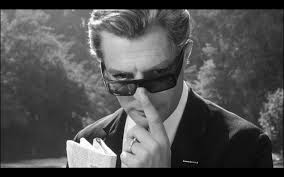Masculinity, Modernity, and the Artistic Crisis in Federico Fellini’s “8 1/2″
Posted on November 29th, 2013 by Anna in Uncategorized | No Comments »
Federico Fellini’s last great masterpiece, 8 ½, can be viewed as his most autobiographical work, the swansong of an artist who is out of ideas and questioning his purpose in life. Like its predecessor La Dolce Vita, 8 ½ is an esoteric, black and white art film starring Marcello Mastroianni as Guido Anselmi, a jaded, egotistical womanizer whose life is one ongoing existential crisis. Rather than a hack journalist, Guido is a big time movie producer trying to come to terms with his life by turning it into a film. The trials he undergoes in trying to get it underway present themselves as dream sequences and flashbacks that blend seamlessly with the absurdity of the modern condition.
8 ½ represents Fellini’s decided move away from the neo-realism school of Italian filmmaking, as it starts off with a nightmare and continues with a series of vignettes that are so surreal that the audience is never entire sure what’s a dream, what’s reality, and whether the whole thing isn’t in fact one of Guido’s egotistical delusions. Throughout the film, strains of classical music serve as a backdrop to the protagonist’s life, symbolizing the artistic ideal he will never attain as long as he remains absorbed in his phony, over-indulged lifestyle. Thus, Fellini deconstructs the fundamental crisis at the heart of every artistic endeavor, that being how can one create something real and beautiful when one’s whole existence is built on lies? As Guido’s hollow relationship with his wife, Louisa, comes to light, he descends deeper and deeper into his memories to try to figure out where his “complex,” as he calls it, originated.
A strong theme running through the movie is that of the stranglehold the Catholic Church exerts over Italy, a nation which can never truly move forward until it turns away from superstition and the Church’s hypocritical moral code. In a dream sequence where Guido begs advice from a cardinal, symbolically obscured by the haze of a steam room and entirely removed from the populace he’s meant to serve, the cardinal sanctimoniously tells him, “Why should you be happy? That is not your task.” Later, in a telling flashback where a gaggle of priests viciously shame a young Guido for dancing with a local madwoman, the audience gets a clue as to the confusion and fascination Guido—and consequently Italian masculinity as a whole—has with women and sexuality. Overwhelmed by the combined pressure of the film industry and his relationship problems, Guido fantasizes a bizarre paradise where he is the master of a harem of women, all of them pandering sexual objects but at the same time mother-figures who cook and clean, and even bathe and swaddle him.
The film ends in a carnival-esque romp with all the characters from Guido’s life—including his wife, who agrees to accept him as he is—suggesting some sort of redemption is in the protagonist’s reach, whether real or imagined. Fellini’s most surreal work, 8 ½ is a pastiche of existence in an Italy torn between tradition and progress, but mostly of the Italian male—macho and perpetually adolescent, trying to create something beautiful but at the same time driven to lie compulsively, all the while incapable of grasping the root of their problems, which is their failure to love.






